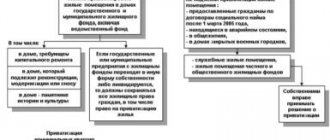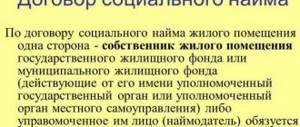The majority of those in need of housing consider their only option to be renting housing from an individual. Simply from the owner of the apartment. However, for part of the population this is not the only option, since government agencies and municipalities may own vacant housing.
Housing owned by the state or municipalities may, under certain conditions, be transferred to social rent after concluding a special social tenancy agreement. What is important is that housing received under such an agreement, again, under certain conditions, can be privatized, that is, transferred into ownership.
What is social housing rental
Legally, social rent is the transfer of state or municipal housing for use by citizens under a special agreement.
For reference. The social tenancy agreement deals with housing that falls under the definition of “social housing”. This is residential space provided free of charge for indefinite residence, but for the entire duration of the contract it is the property of the municipality or state.
Such an agreement is concluded for an indefinite period. An additional bonus for citizens who have never participated in the privatization program will be the right to privatize the housing they received. As a result, it will be possible to dispose of this property at your own discretion.
Please note that all the details of the provision of social housing are defined in Articles 7 and 8 of the Housing Code of the Russian Federation, which must be referred to if your task is to draw up a social tenancy agreement.
What documents are needed to obtain a social tenancy agreement if there is a warrant?
Documents for drawing up an agreement Social rent of housing is possible only after the conclusion of an appropriate agreement between the municipality and the citizen. This is done upon presentation by the applicant of the following documents:
- statement;
- passports and other documents for the future employer and his family;
- decision to allocate free housing;
- certificate of family composition;
- information about the absence of debts for payment of housing and communal services.
Where to get a social tenancy agreement for privatization To carry out the privatization procedure received through social services. Renting an apartment also requires collecting a number of documents. It will not be possible to arrange it without a social tenancy agreement.
If for some reason the employer does not have this document in his hands, then you can get a social tenancy agreement for privatization from the body that originally signed it.
We invite you to familiarize yourself with the Seal of the organization when you need it, Documents to affix stamps in 2020
Step-by-step procedure To receive your social security document.
After the agreement has been concluded, persons acquire the same rights and obligations as the citizen who signed the agreement to receive state property for use.
What form does it take? Before you receive a social tenancy agreement for an apartment, it is worth understanding in what form the document is drawn up. To do this, you need to refer to Article No. 51 of the RF Housing Code.
The regulation states that the agreement can only be drawn up in writing. The document is an administrative act. It is drawn up unilaterally. The information contained in the contract must also meet the established requirements.
Until there is an Agreement, the employer has limited legal capacity. This means that a resident cannot contact the owner on any of the issues that interest him, including the issue of privatization of housing.
The Department of Housing Policy and Housing Fund of the City of Moscow, which exercises the powers of the owner (the city of Moscow) in the housing sector, represented by its district Directorates, together with the territorial government bodies of Moscow (prefectures and district administrations), has been systematically working with Muscovites to conclude Social Security Agreements since 1999. hiring
Therefore, it is worth doing them immediately before applying. A sample paper will help you understand the specifics of drawing up a contract. The second copy of the document is provided within a month after the application. If a citizen acting as an employer dies, the social tenancy agreement will not be provided to another person.
The document will need to be reissued in the name of one of the employer’s family members. It must be taken into account that the agreement not only confers rights, but also imposes a list of responsibilities.
Failure to comply with them will result in violation of housing rights. A social tenancy agreement allows you to receive real estate from the state.
The document regulates legal relations in the area of use of residential premises that are owned by the municipality.
All legal relations are carried out on the basis of the provisions of the Housing Code of the Russian Federation.
Certificate from the place of registration on family composition, issued by the management organization, indicating the date of registration of the employer and family members (valid for 10 days); 3.
The employer's passport or a notarized power of attorney for the right to sign a social tenancy agreement, as well as a copy of the passport (page spreads with registration photo); 4. Original and copy of the court decision.
Based on the Resolution of the city mayor: 1.
Application for concluding a social rental agreement; 2.
Original and copy of the Resolution of the city mayor. To include minor members of the employer's family in a social tenancy agreement, citizens submit the following documents: 1.
contracts by type
If you want to find out how to solve your specific problem, please contact the online consultant form on the right → It's fast and free! Or call us by phone (24/7): If you want to find out how to solve your particular problem, call us by phone.
It's fast and free! Moscow, Moscow region St. Petersburg, Leningrad region 7 (800) 333-45-16 ext.
382 Regions (toll-free call for all regions of Russia) Preferential category Before wondering where to get a social tenancy agreement for residential premises, it is worth noting that citizens can exercise their right to public housing only if they do not have any housing. This means that such citizens not only have nowhere to live at the moment, but also do not own any real estate.
Who can get social housing
The most vulnerable segments of the population can enter into a social rental agreement, but this requires certain grounds and conditions.
Attention! To be able to draw up a social tenancy agreement, two conditions are required:
- the social security department must recognize your family as low-income;
- your family must be officially identified as needing accommodation.
The following grounds are specified in the legislation:
- citizens and members of their families who have not previously participated in the social housing rental program;
- citizens have housing, but it is less than the established norm, based on the number of family members;
- the residential premises are recognized as unfit for habitation;
- one of the family members is sick and his illness poses a danger to others.
The following people can take advantage of the preferential queue for social housing:
- minor children, disabled children, as well as those left without parental care (orphans);
- graduates of orphanages and foster families;
- victims of natural disasters;
- forced migrants;
- residents of emergency premises being prepared for demolition;
- veterans of the Great Patriotic War and labor, as well as combatants;
- liquidators of the Chernobyl accident;
- disabled people, with a non-working group.
There are also special conditions specifying social rent:
- applicants for social housing must have Russian citizenship;
- it is necessary to have a residence permit for ten years in the locality where it is intended to draw up a social tenancy agreement;
- the applicant during the last five years should not have made any transactions with real estate that resulted in a deterioration of its status, for example, exchange, sale, etc.
Who is the social tenancy agreement concluded with?
According to Art. 60 Residential Complex of the Russian Federation
Under a social rental agreement for residential premises, one party - the owner of the residential premises of the state housing stock or municipal housing stock (an authorized state body or an authorized local government body acting on his behalf) or a person authorized by him (the lessor) undertakes to transfer the residential property to the other party - the citizen (tenant) premises for possession and use for living in it under the conditions established by this Code.
According to Art. 69 Housing Code of the Russian Federation
1. Family members of a tenant of residential premises under a social tenancy agreement include his spouse living with him, as well as the children and parents of this tenant.
Other relatives and disabled dependents are recognized as family members of the tenant of the residential premises under a social tenancy agreement if they are settled by the tenant as members of his family and run a common household with him. In exceptional cases, other persons may be recognized as family members of the tenant of a residential premises under a social tenancy agreement in court. 2.Members of the family of the tenant of the residential premises under a social tenancy agreement have equal rights and obligations with the tenant. Members of the family of the tenant of a residential premises under a social tenancy agreement who are capable and limited in their legal capacity by the court bear joint and several liability with the tenant for the obligations arising from the social tenancy agreement. So, in accordance with current legislation, a social rental agreement is concluded with a specific person - the tenant, and members of his family move into the residential premises as members of the tenant's family. A social rental agreement for residential premises is concluded only in writing on the basis of a decision to provide residential premises (order, instruction, etc.).
Don't be afraid to defend your rights in court!
Don’t be afraid to defend your rights in court if the landlord refuses to enter into or change a social tenancy agreement.
How to get social housing
Low-income people have a chance to get social housing, but first they must obtain the status of a low-income family in a social welfare institution in their area.
To complete this procedure, collect and provide the following package of documents:
- copies of passports,
- for children birth certificates,
- TIN,
- marriage certificates.
- for working citizens, certificate 2-NDFL, for the last two calendar years.
- for those who are officially unemployed: a certificate of the amount of unemployment benefits.
- for students, a certificate of the amount of the scholarship.
- for pensioners, certificate of pension amount. Extract from the Unified State Register. If you have your own home: a certificate of ownership, a BTI certificate with an assessment of the value of the property.
It is not necessary to notarize copies of documents; it is enough to provide the social security specialist with the originals of all attached documents.
Risks:
What follows is either a refusal to assign the status of a low-income family or the family is registered. What matters here is the family’s total income and the value of its real estate.
The next step is to contact the housing department of the municipal administration of your locality or the MFC.
How to get a social tenancy agreement
List of documents and procedure:
- application for social housing;
- certificate of family composition (valid for ten days);
- decision of the housing commission that a citizen needs housing;
- conclusion on the unsuitability of housing for further residence: (demolition, recognition as unsafe);
- extract from the house register (valid for one month);
- extract from the citizen’s personal account;
- confirmation that other family members do not have any other housing (valid for an average of two weeks);
- medical certificates confirming illness or disability (copy);
- documents confirming participation: in the military operations of the Second World War, in the liquidation of the Chernobyl disaster (copy);
- certificate of participation in hostilities (copy).
When submitting an application and accompanying documents, ask an administration specialist or MFC for a receipt. The specialist must indicate in the receipt his position, full name, date of admission and date of announcement of the decision, sign and seal.
After one month from the date of submission, the application must be considered. If approved, a social rental agreement for residential premises is concluded.
If it is refused, please clarify the reason for the refusal; the reason for the refusal may be the incorrect execution of some documents, then you need to try to eliminate all violations and resubmit.
In any case, receive a certified copy of the decision.
Possible reasons for deregistration for social housing:
- the citizen himself submitted an application to remove him from the register;
- the family has lost its low-income status (income has increased);
- the citizen left for permanent residence outside the municipality;
- funds were received from the budget for the construction or purchase of housing;
- documents provided that do not correspond to reality;
- the citizen refused the proposed options three times;
- the family has decreased in size.
Read also: – social housing can also be privatized
Social tenancy agreement: how to get social housing in Moscow
The agreement is the main document for renting living space. A warrant is a document that only establishes privileges for use. A warrant without a contract does not confirm legal ownership of social premises.
The Moscow Department of Housing and Policy exercises the powers of a landlord (only in Moscow). Since 1999, they have been signing a social contract with Muscovites. Without signing such a document, Muscovites will have problems with Housing and Operational Control and with other government bodies. Without this document, the resident will not be considered a legal employer.
In accordance with the law, the Moscow department must ensure that citizens who have warrants or other acts of use register and conclude a social housing transaction on behalf of the city of Moscow.
Social tenancy agreement
The subject of this agreement will be a separate living space, that is, isolated.
Attention! An isolated room, but not necessarily an apartment. The main thing is that the room is separate. Non-isolated premises, as well as common areas, cannot be provided for social rent.
Let us remind you that according to Art. 16 of the Housing Code of the Russian Federation, the following are considered residential premises:
- residential building or part thereof;
- apartment or part thereof;
- room.
For example, you can. The contract, in principle, is working, but all clauses should be carefully reviewed in order to adapt to your conditions. Changes are allowed, but no point should worsen the situation of the employer.
The contract must include two parties: “Tenant” - a citizen and “Lender” - the municipality. Both parties sign the agreement and from that moment it comes into legal force.
The text of the contract specifies in detail what kind of housing is provided to the citizen for rent (apartment, house, apartment in a two-flat building, etc.). The address of the property is indicated: (region, district, locality, street, house number), in apartment buildings (building and floor).
The exact footage of the usable and total area of the room is prescribed. Sometimes, when the premises are furnished, a transfer and acceptance certificate is attached to the contract, which indicates all interior items, furniture, household appliances, etc. But more often, empty living space is rented out.
Please note that the clauses of the agreement may contain a definition of the possibility of termination of the agreement at the initiative of the “Lenter”. This is an important point, since inattention when reading the contract can result in forced eviction if this clause of the contract is not fulfilled.
As a rule, the true reasons for termination of the contract may be violations committed by the tenant, for example, using the housing for other purposes (cluttering, which entails the creation of a fire hazard, the proliferation of all kinds of insects and rodents). Violation of silence, petty hooliganism. Delay in payment for utilities and rent, more than six months.
Attention! The social tenancy agreement is terminated automatically in the event of the death of the main employer who signed the agreement.
The norm for the allocated area based on square meters, meters per family member is indicated in Art. 50 Housing Code of the Russian Federation. This norm can be reduced, but not by more than 10%. The parties, by agreement, may introduce important conditions into the contract. After signing the contract, civil legal relations arise between the parties, which in itself entails certain obligations between the parties.
Important! You should check that the terms of the contract are not specified. According to Article 60 of the Housing Code, it must be of unlimited duration.
The agreement is concluded in two copies, one for each party.
How is a social tenancy agreement changed (renegotiated)?
In accordance with paragraph 2 of Art. 82 Housing Code of the Russian Federation
A capable family member of the tenant, with the consent of the remaining members of his family and the landlord, has the right to demand recognition of himself as a tenant under a previously concluded social rental agreement instead of the original tenant.
The same right belongs in the event of the death of the employer to any capable family member of the deceased employer. Thus, answering the question at the beginning of the article, re-conclusion, or more precisely, changing the social tenancy agreement in the event of the death of the employer, is possible with any capable member of his family.
Mandatory conditions for changing the social tenancy agreement in the event of the death of the employer:
- the consent of all adult family members;
- availability of the landlord's consent.
If the landlord refuses to change the social tenancy agreement by recognizing one of the family members of the deceased tenant as the tenant under the social tenancy agreement, it is necessary to apply to the court to declare such a refusal illegal and to make changes to the social tenancy agreement.
If there are sufficient grounds, the court may declare the refusal illegal and satisfy the claims.
Here is a case from judicial practice that clearly illustrates this:
A case from judicial practice
M. appealed to the Administration with a request to recognize her as the tenant of the apartment under a social tenancy agreement after the death of S., with whom she was in a de facto marital relationship, was registered and lived in his apartment for more than 10 years. The administration refused her this, citing the fact that M. was not married to S. and could not be a member of his family. M filed a lawsuit against the District Administration for recognition of the right to use residential premises and the conclusion of a social tenancy agreement. The court, taking into account all the circumstances of the case, satisfied M.’s claim.





